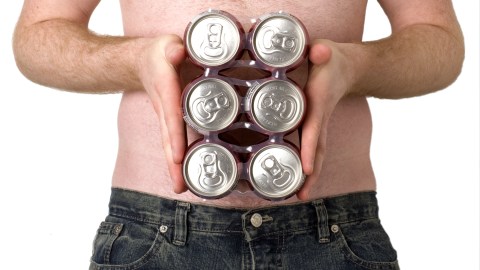Man whose gut brewed beer is cured—by a poop transplant

Photo: Chris Howey / Shutterstock
- Last year, it was reported that a Belgian man arrested for drunk driving brewed the alcohol in his own gut.
- The disorder, auto-brewery syndrome, occurred after he took a round of antibiotics.
- He was cured after a fecal donation from his daughter.
Nearly a year ago, headlines across the web were dominated by a 46-year-old man that brewed his own beer. His artisanal approach was quite unique: his stomach fermented its own contents thanks to a rare disorder known as auto-brewery syndrome (ABS).
You can imagine his surprise when police pulled him over for erratic driving and found he was over double the legal alcohol limit. He hadn’t had a drink all night. The fermenting bacteria produced ethanol in his gut, causing him to appear drunk. It’s a terrible condition.
The syndrome was caused by a round of antibiotics. After experiencing these symptoms for two months, he needed help. Trusting a medical team’s advice, he tried a burgeoning intervention for microbiome trouble: he received a poop transplant.
As with any form of transplant, there are risks. Most people need to match their blood donor. Organ transplants are tricky and result in long waiting lists. Getting someone else’s fecal matter comes with its own potentially damaging side effects.
Fortunately it worked out, as the team behind the transplant writes in Annals of Internal Medicine. Based at Belgium’s University Hospital Ghent, the team reports “what we believe is the first successful treatment of a patient with chronic gut fermentation syndrome by using fecal microbiota transplantation.”
The man received the sample from his 22-year-old daughter. His blood ethanol levels, which were 17 times above normal, have returned to pre-syndrome levels. He even gets buzzed on beer now, at least when he chooses.
What is Fecal Microbiota Transplantation (FMT)?www.youtube.com
Fecal transplants, or bacteriotherapy, help replenish bacterial balance, especially when antibiotics kill too many “good” bacteria. The procedure is most often performed by colonoscopy, though sometimes a nasoduodenal tube is required. While there are a variety of tests needed before doctors will perform bacteriotherapy, fecal transplants actually date back at least 1,700 years to Traditional Chinese Medicine.
Fecal transplants are most commonly performed to treat diseases caused by the bacteria, C. difficile. Over 15,000 people die every year from such diseases.
Researchers are constantly learning more about the incredible complexity and importance of the microbiome. Besides gut-related disorders, bacteriotherapy may soon be used to treat a variety of ailments, including obesity, chronic fatigue syndrome, diabetes, hay fever, and eczema.
The doctors feel confident recommending this particular intervention. Treating ABS often involves changes in diet, probiotics, and drug therapy. Yet antibiotics have strange effects on the microbiome, and in this case, it was enough to make him resistant to the usual therapies.
The team in Belgium is hopeful they’ve found another avenue for treating ABS.
“Moreover, we can imagine a future point – after additional research to evaluate the safety of faecal microbiota transplantation – at which this approach might become standard therapy for gut fermentation syndrome.”
—
Stay in touch with Derek on Twitter, Facebook and Substack. His next book is “Hero’s Dose: The Case For Psychedelics in Ritual and Therapy.”





